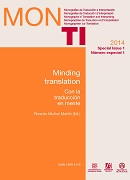Efficacy of screen recording in the other-revision of translations: episodic memory and event models
Contenido principal del artículo
Resumen
Descargas
Detalles del artículo
La propiedad intelectual de los artículos pertenece a los autores y los derechos de edición y publicación, a la revista. Los artículos publicados en la revista podrán ser usados libremente para propósitos educativos y científicos, siempre y cuando se realice una correcta citación del mismo. Cualquier uso comercial queda expresamente penado por la ley.
Citas
Angelone, Erik. (2013) “The impact of process protocol self-analysis on errors in the translation product.” Translation and Interpreting Studies 8:2, pp. 253–271.
Cangiano, Gaston. (2011) Studying Episodic Access to Personal Digital Activity: Activity Trails Prototype. PhD dissertation, University of California, San Diego.
Cangiano, Gaston & James Hollan. (2009) “Capturing and restoring the context of everyday work: A case study at a law office.” Human Computer Interaction 10:5619, pp. 945–954.
Gile, Daniel. (2004) “Integrated problem and decision reporting as a translator training tool.” JoSTrans 2. Electronic version available at: http://www.jostrans.org/issue02/art_gile.php on 20 October 2012.
Ginsburg, Gerald & David Smith. (1993) “Exploration of the detectable structure of social episodes: the parsing of interaction specimens.” Ecological Psychology 5:3, pp. 195–233.
Kiraly, Donald C. (1995) Pathways to Translation: Pedagogy and Process. Kent, OH: Kent State University Press.
Künzli, Alexander. (2007) “A study of the performance of ten profesional translators revising a legal text.” In: Gambier, Yves; Miriam Shlesinger & Radegundis Stolze (eds.) 2007. Doubts and Directions in Translation Studies. Amsterdam: John Benjamins, pp. 115–126.
Massey, Gary; Maureen Ehrensberger-Dow & Andrea Hunziker Heeb. (2013) “Defining phases of the translation process: Revision as a case in point.” Conference paper presented at GAL 2 Sektionentagung, “Übersetzungs- und Dolmetschwissenschaft: Makrodefinitionen und Mikrodefinitionen.” RWTH Aachen, Germany, 19–20 September 2013.
Newston, Darren. (1976) “Foundations of attribution: The perception of ongoing behavior.” In: Harvey, John H.; William J. Ickes & Robert F. Kidd (eds.) 1976. New Directions in Attribution Research. Hillsdale, NJ: Lawrence Erlbaum Associates, pp. 223–248.
NEwston, Darren & Gretchen Engquist. (1976) “The perceptual organization of ongoing behavior.” Journal of Experimental Social Psychology 12:5, pp. 436–450.
Schwan, Stephan & Bärbel Garsoffky. (2004) “The cognitive representation of filmic event summaries.” Applied Cognitive Psychology 18:1, pp. 37–56.
Sellen, Abigail; Andrew Fogg; Mike Aitken; Steve Hodges; Carsten Rother & Ken Wood. (2007) “Do life-logging technologies support memory for the past? An experimental study using SenseCam.” In: Begole, B.; S. Payne; E. Churchill; R. St. Amant; D. Gilmore & M. Rosson (eds.) 2007. Proceedings of the SIGCHI Conference on Human Factors in Computing Systems. New York: ACM Press, pp. 81–90.
Shreve, Gregory. (2006) “The deliberate practice: Translation and expertise.” Journal of Translation Studies 9:1, pp. 27–42.
Tulving, Endel & Donald Thomson. (1973) “Encoding specificity and retrieval processes in episodic memory.” Psychological Review 80:5, pp. 352–373.
Zacks, Jeffrey. (2010) “How we organize our experience into events.” Psychological Science Agenda 24:4. Electronic version available at: http://www.apa.org/science/about/psa/2010/04/sci-brief.aspx on 22 October 2012.
Zacks, Jeffrey & Jesse Sargent. (2010) “Event perception: A theory and its application to clinical neuroscience.” In: Ross, Brian H (ed.) 2010. Psychology of Learning and Motivation, Vol. 53. San Diego, CA: Academic Press, pp. 253–299.
Zacks, Jeffrey; Nicole Speer; Khena Swallow; Todd Braver & Jeremy Reynolds. (2007) “Event perception: A mind/brain perspective.” Psychological Bulletin 133:2, pp. 273–293.


